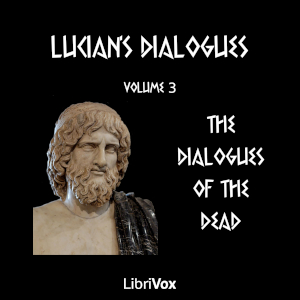Lucian's Dialogues Volume 3: The Dialogues of the Dead
Dialogues of the Dead are 30 miniature dialogues mocking the Homeric conception of the Greek gods, originally written in Attic Greek by Syrian author Lucian of Samosata. Almost 1900 years old, these dialogues still retain a lot of their original humor and wit. - Summary by Foon
The cast list for dialogues with 3 or more readers is given below:
Dialogue 2:
Kroesus: Lynette Caulkins
Pluto: Alan Mapstone
Midas: David Purdy
Sardanapalus: TriciaG
Menippus: Adrian Stephens
Dialogue 3:
Menippus: Adrian Stephens
Amphilochus: Alan Mapstone
Trophonius: Jake Malizia
Dialogue 10:
Charon: Algy Pug
Hermes: ToddHW
Dead Man: David Purdy
Menippus: Adrian Stephens
Charmolaus: TriciaG
Lampichus: Lynette Caulkins
Damasias: Larry Wilson
Kraton: Anna Maria
General: Alex Steele
Philosopher: Alan Mapstone
Orator: Availle
Dialogue 12:
Alexander: Mike Manolakes
Hannibal: Jake Malizia
Minos: Larry Wilson
Scipio: David Purdy
Dialogue 19:
Aeakus: ToddHW
Protesilaus: Alex Steele
Menelaus: Alan Mapstone
Paris: Tchaikovsky
Dialogue 20:
Menippus: Adrian Stephens
Aeakus: ToddHW
Pythagoras: David Purdy
Empedokles: Alan Mapstone
Sokrates: Tchaikovsky
Dialogue 22:
Charon: Algy Pug
Menippus: Adrian Stephens
Hermes: ToddHW
Dialogue 23:
Protesilaus: Alex Steele
Pluto: Alan Mapstone
Persephone: Nichalia Schwartz
Dialogue 25:
Nireus: Alan Mapstone
Thersites: David Purdy
Menippus: Adrian Stephens
Dialogue 27:
Diogenes: ToddHW
Antisthenes: Anna Maria
Krates: Alan Mapstone
Poor Man: David Purdy
Audio edited by Availle and Linette Geisel
Genre(s): Classics (Greek & Latin Antiquity), Dramatic Readings, Satire
Language: English
Keyword(s): mythology (50), greece (47), gods (11), belief (7), dead (5), underworld (5), pluto (4), life after death (2), hades (1)
